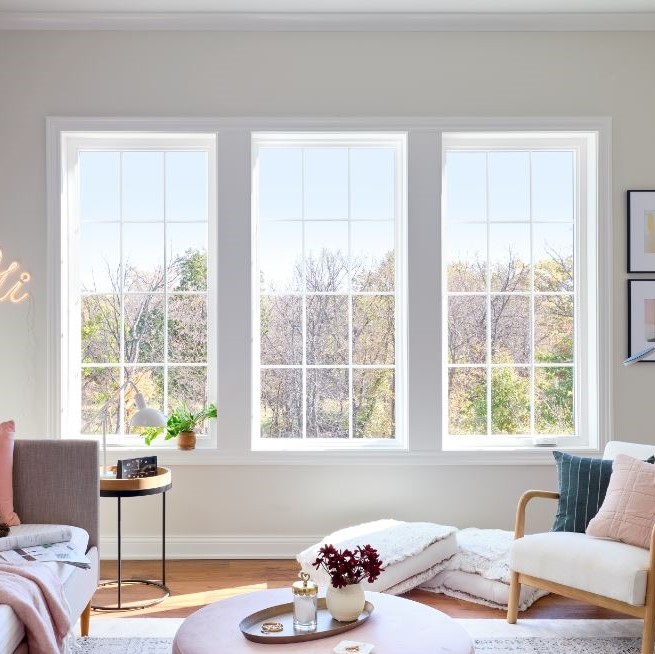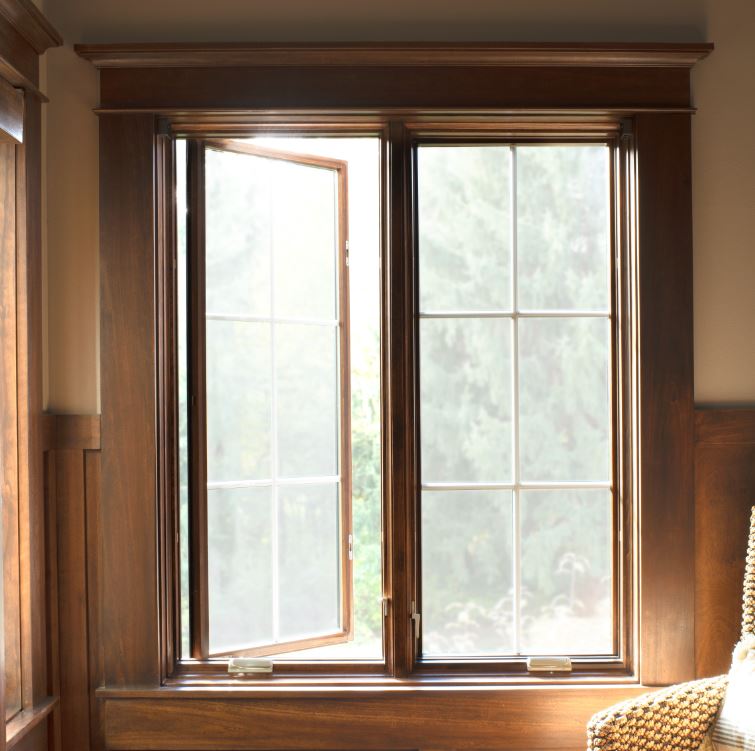Ahhh, the great debate: double-paned or triple-paned windows? Homeowners across the country grapple with this topic when trying to determine which window solution is best for their homes. We totally get it! That is why we, Buresh Home Solutions, have done the research to share the benefits of double vs. triple-paned windows.
The Benefits of Double vs. Triple-paned Windows
Double-paned windows consist of two pieces of glass separated by a layer of air or gas, typically either argon or krypton. This type of window can be very efficient in preventing heat loss in cold climates. Double-paned windows also provide noise reduction due to the air between the two panes acting as insulation. Windows with two panes are more cost-effective than those with triple panes since they require less material and fewer people to install them.
Triple-paned windows are composed of three layers instead of two—two pieces of glass separated by two layers of gas (often argon or krypton). The third pane allows for additional energy efficiency, as well as extra soundproofing which may be beneficial if you live near a busy street or noisy environment.
Both double and triple-paned windows offer a variety of benefits depending on your climate and lifestyle needs. Double-paned provides an efficient and cost-effective solution while triple-pane can increase thermal efficiency and soundproofing properties at a greater cost. Now that you’ve learned about the benefits of both double and triple-paned windows from Buresh Home Solutions, it’s time to look into the design and style options available.
Triple-pane windows can save 25% on heating and cooling expenditures, while double-pane windows can save 12%. Double-pane windows have an R-value of 2–2.5, whereas triple-pane windows have 3–4. Triple-pane windows are estimated to reduce sound travel by an additional 50 per cent compared to double-pane windows, providing improved soundproofing within the home.
Design and Style Options
Many homeowners consider window style to be a major factor when making the purchase decision and this involves the option of double or triple-paned windows. Double panes contain two panes of glass held together with a layer of inert gas between them, while triple-paned windows consist of three panes of glass instead of two.
Double-paned windows come in many styles that are available in different colors. Homeowners can choose from traditional and contemporary designs. They also come in popular styles, such as double hung, casement, bay and bow, picture, and sliders that give any room an updated look and feel.
Triple-paned windows also come in several sizes, shapes, and colors, which makes it easy for homeowners to match the surrounding décor and architecture of their homes. The most popular varieties are casements, awnings, egress windows, and picture windows. Depending on the size and brand you choose, you can even find triple-paned units with operable panels. Triple-paned windows tend to look bulkier than their double-pane counterparts due to the increased depth created by the additional glazing unit.
Durability and Energy Efficiency
When it comes to durability and energy efficiency, double and triple-paned windows both boast their own advantages. Double-paned windows are often cheaper and more lightweight – easy to install and maintain, plus they require little additional energy to operate. On the other hand, triple-paned windows provide enhanced insulation protection, increased energy efficiency, and a much higher R-value rating due to the larger airspace between each pane. The extra airspace creates a barrier from humidity, condensation, and drafts as well.
The most important factor in choosing a window for durability and energy efficiency is its airtightness or “air seal”. Airtight windows reduce the potential for moisture build-up, ultimately decreasing the need for costly repairs due to water damage. Since triple-pane windows have three panes instead of two, there are more opportunities for airtight seals which can greatly improve your window’s performance.
Overall, double-pane and triple-pane windows both offer unique benefits that could be beneficial depending on the user’s needs and budget. Considerations should include the climate in which you live and how much money you want to spend upfront versus saving money down the line with improved efficiency over time.
Efficiency, Noise Reduction & Insulation Benefits
Double-paned windows consist of two glass panes separated by a layer of air or other inert gas such as argon or krypton. This air gap works to insulate the room and reduce the external noise that might otherwise enter, providing an insulated barrier.
A triple-paned window adds an additional layer of glass to the existing construction and overall thickness of the unit. While this can offer greater insulation from noise and temperature fluctuations, it may not necessarily be more efficient in most cases.
Ultimately, it’s important to consider all factors when weighing the pros and cons of double vs triple-paned window options. Consider your climate and any special needs you may have such as soundproofing when deciding which window type is right for you.
Increase Air Temperature & Save Money
One of the most important reasons for selecting double or triple-paned windows for your home is the ability to increase air temperature and save money. During the winter, the insulating layer helps maintain the air warm, removing the need for a heater. In addition, during hot summer months, the glass panes provide a barrier that prevents outdoor heat from entering the home, which can help cool the building more quickly and reduce air conditioning usage.
Triple-paned windows have a 0.30 BTU/hr/sf°F insulative value, compared to 0.22 for double-paned windows. Triple-paned windows are 33% more successful in keeping heat out in summer and 34% more effective in winter.
In summary, double-pane windows are cost-effective and energy-efficient enough for most homes. In contrast, triple-panes may be worth considering if you live in an extreme climate zone with severe swings in temperature. The energy savings achieved by installing triple-pane windows will often offset the added cost of purchasing and installation within a few years.

Environment & Energy Saving Benefits
You should think about the window’s environmental and energy-saving benefits while making your final decision. Double-paned windows are generally recommended for those who are looking for better energy efficiency and environmental sustainability. These windows offer two panes of glass with a space for air or other inert gas between them. This space inhibits heat from passing through, which actually helps reduce energy costs since your home won’t need to use as much energy for temperature control or climate control.
Current trends suggest that these windows offer at least 25% more efficiency than double-pane options. With the additional space in between each pane, a triple-pane window will have an additional layer of insulation leading to exceptional temperature control, no matter what kind of weather you experience outside. Plus, these windows also help minimize street noise when properly installed and sealed within your home.
Should You Install Double or Triple-paned Windows?
Your preference is the deciding factor when deciding between double and triple-pane windows. Cost, energy efficiency, and appearance are important.
It is possible that installing either a double or a triple-paned window will fit into both needs. If the price difference between double and triple panes isn’t too high (or if you qualify for tax credits), then getting a triple-paned window may be worthwhile in the long run. However, if you don’t expect major changes in weather or temperature throughout the year, then it might make more sense (and be more economical) to stick with installing double panes.

